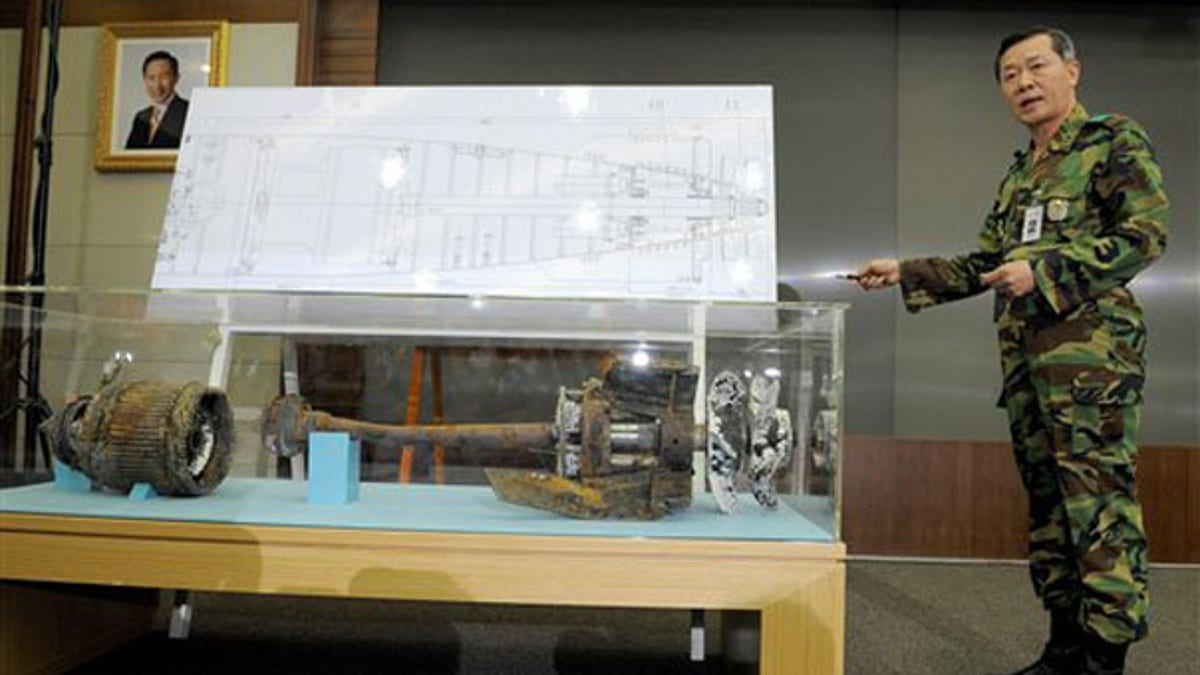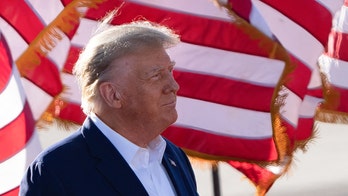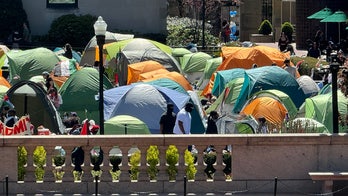
A South Korean military officer shows torpedo parts salvaged from the Yellow Sea during a press conference in Seoul May 20. (AP Photo)
The delicate standoff on the Korean peninsula over charges that North Korea sank a South Korean ship -- killing 46 sailors -- stands as a compelling example of why rogue states want nuclear weapons.
Nobody wants to mess with them.
"No other state their size on Earth has that kind of military capability," said Bruce Bechtol, author of "Red Rogue: The Persistent Challenge of North Korea."
South Korean and U.S. officials are now weighing their options for how to handle the findings of an investigative report that formally blamed a North Korean torpedo attack for sinking the frigate Cheonan on March 26. Defense Secretary Robert Gates stressed Thursday that the South Koreans are calling the shots and "we will be consulting very closely with them as we move ahead." The State Department said there would be "consequences."
But the early response is almost certain to come in the form of public condemnation and economic sanctions rather than military action, observers say. Administration officials would not go so far as to label the attack an act of war -- White House Press Secretary Robert Gibbs said he would not get into "hypotheticals" when asked if the dispute could lead to war. Adm. Mike Mullen, chairman of the Joint Chiefs of Staff, said the United States is focused on supporting its "strong ally" while at the same time considering "stability in that region."
The nuclear arsenal isn't necessarily the biggest worry, since the regime is incapable of delivering those weapons on a long-range missile that could hit, say, the United States. The country's sizable military and arsenal of conventional weapons -- which are well in range of Seoul -- make the prospect of all-out war on the peninsula terrifying. That's what North Korea is threatening as it accuses South Korea of fabricating evidence.
But Bechtol, a professor at the U.S. Marine Corps Command and Staff College, said North Korea holds a major "deterrent" in its hands with its nuclear arsenal. While delivery methods are limited, he said the North is capable of using aircraft or ships to attack the South with a nuclear weapon and could also use a medium-range missile to hit countries as far away as Japan.
All this inevitably factors in as South Korea and its allies consider a response. And it demonstrates why the Obama administration is so keen on halting the development of nuclear weapons.
The administration has been on a high-profile campaign over the past several months to reduce nuclear arsenals around the world and keep nations like North Korea and Iran from developing them. The United Nations this week reviewed a proposal for new sanctions against Iran over its nuclear program, which the country's government insists is for peaceful purposes.
Doug Bandow, a senior fellow at the Cato Institute, said it's unlikely Kim Jong Il would try to deploy a nuclear weapon, but the danger of the country's weapons getting loose should the regime fall apart in the throes of a military conflict is what worries officials.
In the near-term, he said North Korea's ability to inflict major damage on South Korea with conventional weapons is what will lead nations like the United States to urge restraint.
White House Press Secretary Robert Gibbs said in a written statement Wednesday that the United States "strongly condemns the act of aggression," but left open the door to what options the United States is considering.
"This attack constitutes a challenge to international peace and security," he said. "It reinforces the resolve of its neighbors to intensify their cooperation to safeguard peace and stability in the region against all provocations."
But Bandow said that if the South Korean's investigative findings are correct, "This suggests the North committed an act of war."
He said the challenge is to punish North Korea without triggering a military conflict.
"To sink a South Korean ship is a major provocation," he said. "There are no good answers here."
A U.S. official told FoxNews.com that the United States is waiting until South Korean President Lee Myung-bak meets with his government on Monday and will take its cues from there.
"South Koreans have the lead on this issue. Obviously we support them," the official said.
Bechtol said that while South Korea has probably not taken military action off the table, such a response is unlikely.
He added: "If North Korea conducts another provocation then all bets are off."




